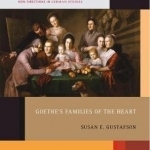Goethe's Families of the Heart
BookThis item doesn’t have any media yet
2017 | Essays
Throughout his literary work Goethe portrays characters who defy and reject 18th and 19th century ideals of aristocratic and civil families, notions of heritage, assumptions about biological connections, expectations about heterosexuality, and legal mandates concerning marriage. The questions Goethe's plays and novels pose are often modern and challenging: Do social conventions, family expectations, and legal mandates matter? Can two men or two women pair together and be parents? How many partners or parents should there be? Two? One? A group? Can parents love children not biologically related to them? Do biological parents always love their children? What is the nature of adoptive parents, children, and families? Ultimately, what is the fundamental essence of love and family? Gustafson demonstrates that Goethe's conception of the elective affinities is certainly not limited to heterosexual spouses or occasionally to men desiring men.
A close analysis of Goethe's explication of affinities throughout his literary production reveals his rejection of loveless relationships (for example, arranged marriages) and his acceptance and promotion of all relationships formed through spontaneous affinities and love (including heterosexual, same-sex, nonexclusive, group, parental, and adoptive).
Related Items:
| Published by | Bloomsbury Publishing Plc |
| Edition | Unknown |
| ISBN | 9781501336072 |
| Language | N/A |
Images And Data Courtesy Of: Bloomsbury Publishing Plc.
This content (including text, images, videos and other media) is published and used in accordance
with Fair Use.
